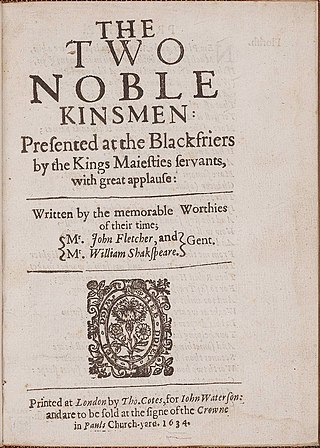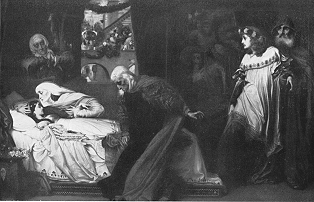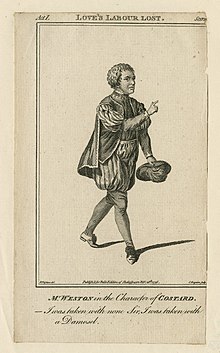
Sir John Falstaff is a fictional character who appears in three plays by William Shakespeare and is eulogised in a fourth. His significance as a fully developed character is primarily formed in the plays Henry IV, Part 1 and Part 2, where he is a companion to Prince Hal, the future King Henry V of England. Falstaff is also featured as the buffoonish suitor of two married women in The Merry Wives of Windsor. Though primarily a comic figure, he embodies a depth common to Shakespeare's major characters. A fat, vain, and boastful knight, he spends most of his time drinking at the Boar's Head Inn with petty criminals, living on stolen or borrowed money. Falstaff leads the apparently wayward Prince Hal into trouble, and is repudiated when Hal becomes king.

The Tragedy of Othello, the Moor of Venice, often shortened to Othello, is a tragedy written by William Shakespeare around 1603. Set in Venice and Cyprus, the play depicts the Moorish military commander Othello as he is manipulated by his ensign, Iago, into suspecting his wife Desdemona of infidelity. Othello is widely considered one of Shakespeare's greatest works and is usually classified among his major tragedies alongside Macbeth, King Lear, and Hamlet. Unpublished in the author's life, the play survives in one quarto edition from 1622 and in the First Folio.

The Tragedy of Romeo and Juliet, often shortened to Romeo and Juliet, is a tragedy written by William Shakespeare early in his career about the romance between two Italian youths from feuding families. It was among Shakespeare's most popular plays during his lifetime and, along with Hamlet, is one of his most frequently performed. Today, the title characters are regarded as archetypal young lovers.

Love's Labour's Lost is one of William Shakespeare's early comedies, believed to have been written in the mid-1590s for a performance at the Inns of Court before Queen Elizabeth I. It follows the King of Navarre and his three companions as they attempt to swear off the company of women for three years in order to focus on study and fasting. Their subsequent infatuation with the Princess of France and her ladies makes them forsworn. In an untraditional ending for a comedy, the play closes with the death of the Princess's father, and all weddings are delayed for a year. The play draws on themes of masculine love and desire, reckoning and rationalisation, and reality versus fantasy.

The Tragedy of Richard the Third, often shortened to Richard III, is a play by William Shakespeare. It was probably written c. 1592–1594. It is labelled a history in the First Folio, and is usually considered one, but it is sometimes called a tragedy, as in the quarto edition. Richard III concludes Shakespeare's first tetralogy and depicts the Machiavellian rise to power and subsequent short reign of King Richard III of England.

The BBC Television Shakespeare is a series of British television adaptations of the plays of William Shakespeare, created by Cedric Messina and broadcast by BBC Television. Transmitted in the UK from 3 December 1978 to 27 April 1985, the series spanned seven seasons and thirty-seven episodes.

William Kempe, commonly referred to as Will Kemp, was an English actor and dancer who specialised in comic roles. He was best known as one of the original stage actors in early dramas by William Shakespeare, and roles associated with his name may have included the comic creation Falstaff. His contemporaries considered him to be a successor to the great clown of the previous generation, Richard Tarlton.

William Shakespeare (1564–1616) wrote sonnets on a variety of themes. When discussing or referring to Shakespeare's sonnets, it is almost always a reference to the 154 sonnets that were first published all together in a quarto in 1609. However, there are six additional sonnets that Shakespeare wrote and included in the plays Romeo and Juliet, Henry V and Love's Labour's Lost. There is also a partial sonnet found in the play Edward III.

Love's Labour's Lost is a 2000 British musical romantic comedy film written, directed by and starring Kenneth Branagh, based on the comic play of the same name by William Shakespeare. The first feature film to be made of this lesser-known comedy, Branagh's fourth film of a Shakespeare play was a box-office and critical disappointment.

This article presents a possible chronological listing of the composition of the plays of William Shakespeare.
Honorificabilitudinitatibus is the dative and ablative plural of the medieval Latin word honōrificābilitūdinitās, which can be translated as "the state of being able to achieve honours". It is mentioned by the character Costard in Act V, Scene I of William Shakespeare's Love's Labour's Lost.

The Two Noble Kinsmen is a Jacobean tragicomedy, first published in 1634 and attributed jointly to John Fletcher and William Shakespeare. Its plot derives from "The Knight's Tale" in Geoffrey Chaucer's The Canterbury Tales, which had already been dramatised at least twice before, and itself was a shortened version of Boccaccio's epic poem Teseida. This play is believed to have been originally performed in 1613–1614, making it William Shakespeare's final play before he retired to Stratford-upon-Avon, where he died in 1616.

Shakespeare's plays are a canon of approximately 39 dramatic works written by the English poet, playwright, and actor William Shakespeare. The exact number of plays as well as their classifications as tragedy, history, comedy, or otherwise is a matter of scholarly debate. Shakespeare's plays are widely regarded as among the greatest in the English language and are continually performed around the world. The plays have been translated into every major living language.

William Shakespeare's sexuality has been the subject of frequent debates. It is known from public records that he married Anne Hathaway and had three children with her; scholars have examined their relationship through documents, and particularly through the bequests to her in his will. Some historians have speculated Shakespeare had affairs with other women, based on contemporaries' written anecdotes of such affairs and sometimes on the "Dark Lady" figure in his sonnets. Some scholars have argued he was bisexual, based on analysis of the sonnets; many, including Sonnet 18, are love poems addressed to a man, and contain puns relating to homosexuality. Whereas, other scholars criticized this view stating that these passages are referring to intense platonic friendship, rather than sexual love. Another explanation is that the poems are not autobiographical but fiction, another of Shakespeare's "dramatic characterization[s]", so that the narrator of the sonnets should not be presumed to be Shakespeare himself.
Thomas of Woodstock and Richard the Second Part One are two names for an untitled, anonymous and apparently incomplete manuscript of an Elizabethan play depicting events in the reign of King Richard II. Attributions of the play to William Shakespeare have been nearly universally rejected, and it does not appear in major editions of the Shakespeare apocrypha. The play has been often cited as a possible influence on Shakespeare's Richard II, as well as Henry IV, Parts 1 and 2, but new dating of the text brings that relationship into question.

Count Paris or County Paris is a fictional character in William Shakespeare's Romeo and Juliet. He is a suitor of Juliet. He is handsome, wealthy, and a kinsman to Prince Escalus.

The Shakespearean fool is a recurring character type in the works of William Shakespeare.

Thousands of performances of William Shakespeare's plays have been staged since the end of the 16th century. While Shakespeare was alive, many of his greatest plays were performed by the Lord Chamberlain's Men and King's Men acting companies at the Globe and Blackfriars Theatres. Among the actors of these original performances were Richard Burbage, Richard Cowley, and William Kempe.

As You Like It is a pastoral comedy by William Shakespeare believed to have been written in 1599 and first published in the First Folio in 1623. The play's first performance is uncertain, though a performance at Wilton House in 1603 has been suggested as a possibility.
The costard was a variety of apple popular in medieval England, and the second apple-variety introduced by the Normans. It was grown widely as a commercial crop by the 13th century and was supplied to the household of Edward I in 1292. It remained widespread for several hundred years, until other apple varieties gained popularity during the 17th century. It is thought to have been a cooking apple and was perhaps similar to the modern Bellflower apple. It is said to have been named for its resemblance to the human head.

![Quote by Costard from the 1598 quarto using the word honorificabilitudinitatibus; his name is given as "Clow[n]." Love's Labour's Lost - first quarto (1598) - page 47 - honorificabilitudinitatibus.jpg](http://upload.wikimedia.org/wikipedia/commons/thumb/5/5c/Love%27s_Labour%27s_Lost_-_first_quarto_%281598%29_-_page_47_-_honorificabilitudinitatibus.jpg/220px-Love%27s_Labour%27s_Lost_-_first_quarto_%281598%29_-_page_47_-_honorificabilitudinitatibus.jpg)















